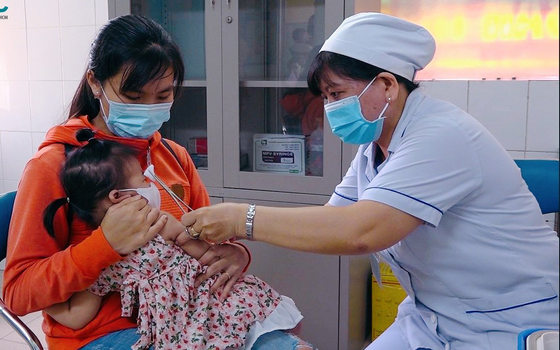 |
Shortages of vaccines in the EPI happen in many provinces. |
Regarding the shortage of vaccines in many localities participating in the Expanded Program on Immunization (EPI), the Ministry of Finance (MoF) has recently sent a document to the Government Office, offering recommendations for the procurement of vaccines for the EPI, ARV drugs, tuberculosis medications, and vitamin A.
According to the MoF, the budget for procuring vaccines in the EPI has changed over the years. In the period from 2016 to 2022, this funding was covered by the central budget. However, from 2023, the central budget will no longer allocate funds for this purpose, and it will become the responsibility of local budgets to ensure the necessary funding.
The MoF has sent three official dispatches requesting the Ministry of Health (MoH) to prepare the budget estimate for 2023 and provide instructions for its implementation at the local level. If there is a need to allocate funds from the central budget to purchase specific drugs and vaccines for children under 5 years old, the MoH will submit the proposal to the relevant authority for review and decision-making to establish the basis for the allocation from the central budget.
"Until now, the MoH has not submitted any proposals to the competent authority for the allocation of funds from the central budget to purchase vaccines for the EPI. Therefore, the MoF does not have a basis to allocate funds from the central budget for vaccine procurement," stated the MoF.
Additionally, the MoF clarified the suggestions from localities regarding the obstacles faced in vaccine procurement. Accordingly, 16 provinces and cities have reported difficulties and obstacles in purchasing vaccines for EPI. They have requested the MoH to take the lead in centralized bidding, placing orders, or negotiating prices.
However, the MoF has expressed its disagreement with the MoH's request to be authorized to summarize needs and place orders with domestic vaccine manufacturers for EPI vaccination. According to the MoF, this request is deemed inappropriate. Consequently, the MoF has sought assistance from the Government Office to gather the Ministry of Justice's opinions on the matter of authorization.
In regards to the proposal for the MoF to assess and approve pricing as the foundation for localities to enter into procurement contracts, the MoF has clarified that its authority is limited to setting maximum prices based on appraisals and proposals from the MoH, specifically in cases involving the central budget. The MoF does not possess the power to appraise and approve specific prices for procurement, nor does it have the authority to establish maximum prices for products or services procured through the local budget.
Meanwhile, the MoH recently provided information to the press regarding measures to address the vaccine shortage in the EPI. Regarding domestically produced vaccines, the MoH stated that the manufacturing units, being either state-owned enterprises or non-business units under the MoH, are ineligible to participate in bidding processes. Therefore, the MoH proposed that, for domestically produced vaccines, localities should submit their demand to the MoH, authorize the MoH to place orders, and simultaneously seek the Government's approval to procure through the ordering method.
Furthermore, in order to meet the current urgent vaccine demand, the MoH recommended that the Government issue a resolution allowing the implementation of vaccine procurement mechanisms for EPI using local budget funds.
Regarding the ten types of domestically-produced vaccines used in the EPI, the MoH recommends entrusting the MoH with the responsibility of consolidating the demand from localities, placing orders, and compiling options from vaccine manufacturers. Provinces and cities authorize the MoH to place orders with domestic vaccine manufacturers. The MoF will assess and approve the pricing as the foundation for localities to sign procurement contracts and make direct payments to the suppliers.
























